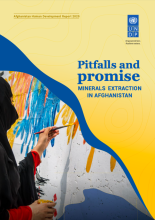/ library resources
Showing items 1 through 9 of 228.The extractive industry can be an important source of human development, economic growth, government revenues and foreign investments.
As part of the broader United Nations Development Programme and United Nations Environment Programme (UNDP/UNEP) Poverty-Environment Initiative (PEI), Phase 1 Project, the overall objective of this study is to develop a framework to assess the impact of land degradation and the benefits of SLM.
Across South Asia, many rural people use common land to harvest naturally-growing plants, grow crops and feed their livestock. Increasingly this activity is being commercialized as farmers move to sell the produce they obtain.
Poverty, property rights and distributional implications of community-based resource management have become major topics of discussion and debate in recent years.
The study analyzes the impact of degradation of private land as well as common land resources on migration decisions in three dryland districts in Gujarat.
Across the developing world the way in which land is controlled and managed has been steadily changing. In the past fifty years, community ownership has increasingly given way to privatization.
The paper analyzes a sample of existing or in-formulation policy frameworks governing access and security of tenure over major natural assets such as land, forests and wildlife.
This publication, ‘Island Innovations – UNDP and GEF: Leveraging the Environment for the Sustainable Development of SIDS’, demonstrates that far from succumbing to these challenges, SIDS have time and again risen to the task of managing their fragile environments to meet their sustainable develop
Pagination
Land Library Search
Through our robust search engine, you can search for any item of the over 73,000 highly curated resources in the Land Library.
If you would like to find an overview of what is possible, feel free to peruse the Search Guide.








